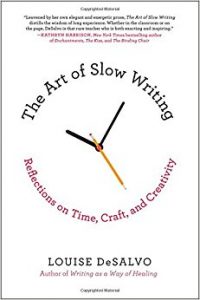 The universe has such a sense of humor.
The universe has such a sense of humor.
A few weeks ago I started reading The Art of Slow Writing by Louise DeSalvo. Literally within a day of cracking chapter one, I accepted three rush writing jobs. I used to take on quick turnaround projects fairly often, but it’s been a while since I’ve done it. In this case, two of the jobs were for editors I knew and respected (and I’d written for them before so I understood their needs) and both were on familiar subjects. The third job was a referral from another writer on a subject I knew nothing about, and one completely out of my comfort zone. Deciding that I needed the challenge of stretching myself and learning something new, I took it on too.
Soon after, my world became a frantic, one-note song. As Louise DeSalvo waxed on eloquently and with great passion about the joy, the need and the benefits of slow writing, I wrote faster and faster. My focus became insular, my thoughts revolved around the jobs I had in front of me, the looming deadline, the fact that I couldn’t let these editors down. Write, write, write. Quick, quick, quick. One of the jobs became problematic; another simply took longer than it should have because the subject demanded considerably more word space than I’d been allotted.
As one week stretched into two and my deadline loomed closer, my attention to the outside world – family, friends, Team Sheltie, the garden, even the hour I normally devote to making dinner – faded along with my patience, my serenity, my ability to focus on anything beyond the work. My self-absorption was complete.
I saw it happening. When emails and calls to sources weren’t returned as quickly as I expected (or wanted), my inner toddler began to pout. I pacified her, dug deep and stayed in adult mode but, in truth, I expected the world to speed up right along with me.
There’s a reason for that. As DeSalvo points out in her book, we are a society in ‘hurry up’ mode. We’re conditioned to expect, appreciate and reward speed. Rather than putting a letter or a card in the mail and waiting a week or more for it to arrive, emails can be delivered electronically in a minute or two. Text messages are even faster, pinging their arrival in mere seconds. It’s a far different world than it was before air mail. Back then, overseas mail went by ship and could take weeks, months even, to reach its destination. In the sixteenth century, DeSalvo says it could take years to receive a reply to a letter you sent to Europe.
DeSalvo believes we’ve internalized the idea that the only things worth doing are those things that can be accomplished quickly. Writers, particularly those writing commercial fiction, equate their worth with the speed of their output. In the world of sales, reps are rewarded by how quickly they land the client. World leaders are judged on what they can accomplish not just in their full term, but in their first one hundred days.
Don’t get me wrong, fast isn’t always bad. A delicious stir fry can be made and served in fifteen minutes. A heartfelt apology can be delivered in five. Reading haiku takes mere seconds. So does saying ‘I love you.’
I’ll take on tight deadlines again. I’m a bit of an adrenaline junkie, probably from years spent in radio and TV news where putting together a story for that hourly (or daily) newscast was, well, a rush. But I’m not going to ignore or think less of the writing I do that requires time and attention to come to its full potential. I’m not going to stay in hurry up mode as a matter of routine.
As my sat down to write this blog, Mr. Petrol Head gave me a ‘just because it’s Wednesday’ gift: he came home with a Bluetooth speaker, something I’d lusted after for a while. So I’m writing this to music. So far I haven’t heard a single one-note song. One-note songs apparently aren’t all that common. I’m guessing it’s because playing a one-note song – living a one-note song – means missing out on the beauty of life’s orchestra.
And who would want to miss out on that?

 For those of us who are news junkies, last week was tough (one could argue that news junkies have had it tough for the last two years, but that’s a whole ‘nother blog). I spent way too much time focused on the Ford/ Kavanaugh testimony before the U.S. Senate, and listening to the analysis afterwards. It brought up a host of emotions for me, not the least of which was how difficult, painful and costly it can be to speak your truth, even when others attempt to deny it.
For those of us who are news junkies, last week was tough (one could argue that news junkies have had it tough for the last two years, but that’s a whole ‘nother blog). I spent way too much time focused on the Ford/ Kavanaugh testimony before the U.S. Senate, and listening to the analysis afterwards. It brought up a host of emotions for me, not the least of which was how difficult, painful and costly it can be to speak your truth, even when others attempt to deny it. The universe has such a sense of humor.
The universe has such a sense of humor.



Comments